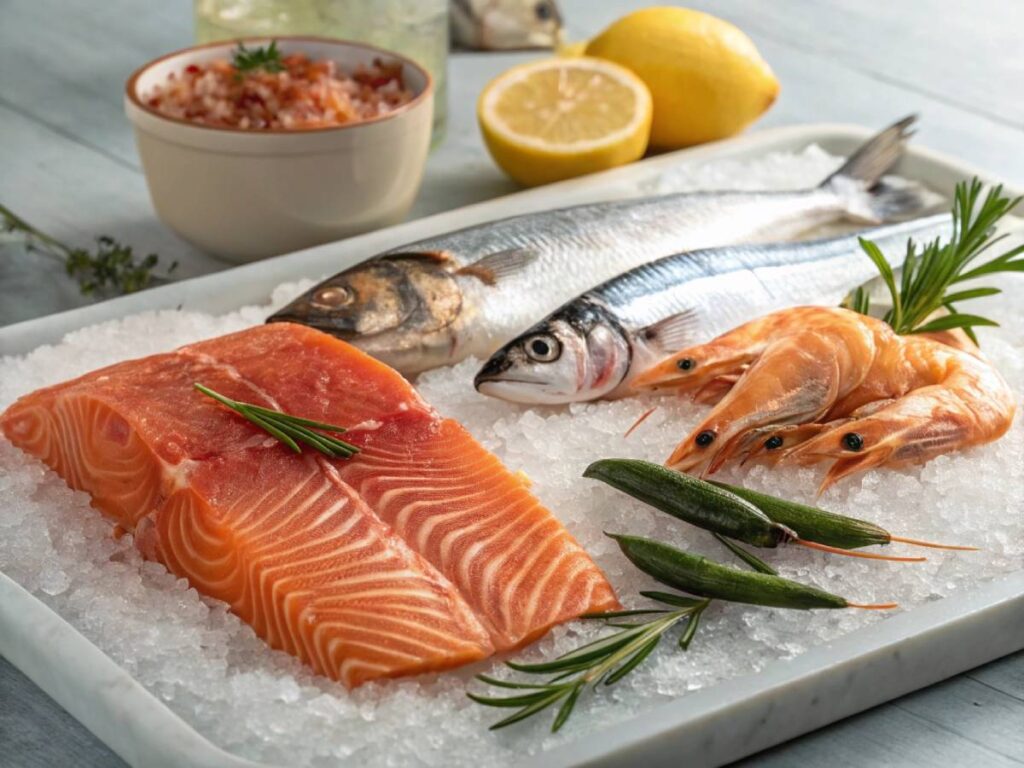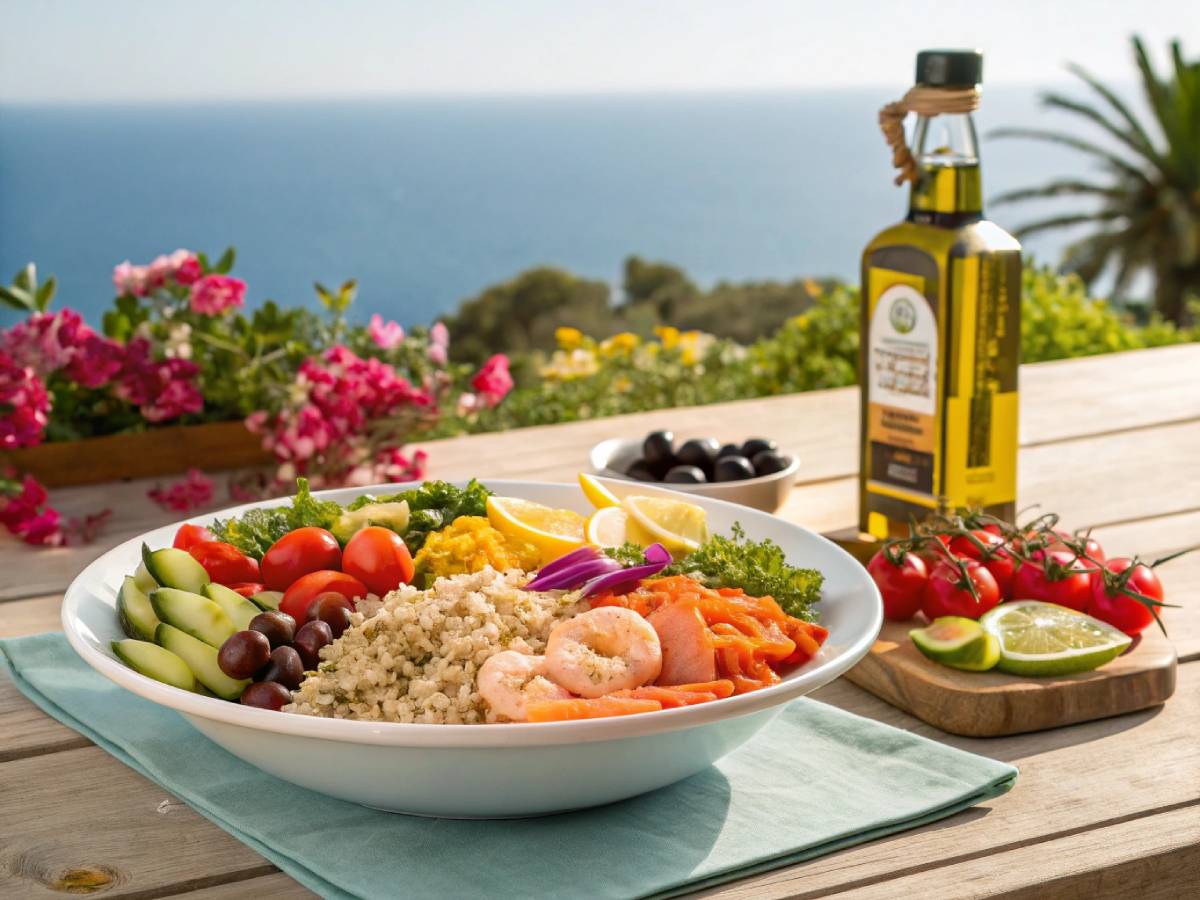Embarking on the Mediterranean diet journey is like opening the door to a vibrant world of flavors and health benefits.
Imagine strolling through a bustling market, selecting fresh, colorful produce, rich olive oils, and wholesome grains that not only tantalize your taste buds but also nourish your body.
This guide simplifies your Mediterranean diet shopping experience, ensuring you have all the essentials to create delicious, heart-healthy meals.
Whether you’re a seasoned foodie or a kitchen newbie, discover how easy it is to embrace this acclaimed lifestyle with our comprehensive shopping list essentials.
Key Components of a Mediterranean Diet
So you wanna dive into the delicious world of Mediterranean eating, huh? Smart choice! Let’s chat about what makes this diet a superstar and how you can get started with just a trip to your local grocery store.
Building a Mediterranean Diet Shopping List
Grabbing the right stuff for your Mediterranean diet isn’t rocket science, but there are a few goodies you’ve gotta toss in your cart. Think: fresh produce, those golden healthy fats, and grains that aren’t loaded with junk.
Vegetables and Fruits:

When it comes to veggies and fruits, aim for the fresh and locally grown stuff. Load up on greens like spinach, crunchy broccoli, or juicy berries and crisp apples. It’s like shopping for a rainbow, with each color packing its own set of goodies for your body.
Healthy Fats:
Olive oil, nuts, and seeds are your go-to’s here. These healthy fats are like little superheroes for your heart, keeping it ticking happily.
Whole Grains:
Don’t skip on the good stuff like brown rice or quinoa. Whole grains keep you full and provide a lot more than just calories—they pack fiber and nutrients that your body will thank you for.
Herbs and Spices:
Bored of bland meals? Herb-it-up! Basil, oregano, rosemary, and thyme not only make your dishes smell like a dream, but they also boost flavor sans the added salt or sugar.
Wanna dive deeper? Check out our full list of must-have ingredients in our mediterranean diet food list.
Benefits of a Mediterranean Diet
Jumping on the Mediterranean diet train doesn’t just mean tasty meals—it’s got loads of perks, from making that waistline a bit friendlier to warding off some nasty health issues.
Weight Management:
Trying to keep that belt from getting too tight? The Mediterranean diet’s focus on whole, plant-based goodies helps you manage your weight without counting every crumb. Hungry for a meal plan? Peep our mediterranean diet meal plan.
Cardiovascular Health:
Olive oil and nuts are having their moment here, with studies showing they’re great for your heart. Folks committed to this diet often see a dip in heart disease risks (Cleveland Clinic).
Blood Sugar Stability:
Keeping your blood sugar steady is a big deal, especially if you’re dealing with diabetes or trying to keep things in check. This diet mixes nutrients like a pro, keeping those sugar levels in line. Curious? Dive into our piece on mediterranean diet diabetes.
| Why It Rocks | What’s Behind It |
|---|---|
| Managing Weight | Whole Foods Focus |
| Heart Happiness | Heart-Healthy Fats |
| Steady Blood Sugar | Nutrient Balance |
With a focus on fresh food and no-nonsense ingredients, the Mediterranean diet is not just a feast for the senses but a boost for your health. Curious about all it has to offer? Check out our articles on mediterranean diet benefits for all the ways this diet can make you feel great.
Foundation Foods for a Mediterranean Diet
The Mediterranean diet is all about those lip-smacking, plant-powered goodies that pack a nutritional punch. Think veggies, fruits, and other plant-based delights that boost your health and keep your taste buds dancing. Here, we’ve got the lowdown on what you need for your Mediterranean diet shopping list.
Fruits and Vegetables
Fruits and veggies are the heavy hitters in a Mediterranean diet. They dish out the vitamins, minerals, fibers, and antioxidants your body craves. Fresh, frozen, dried, or canned—just keep an eye on those labels for sneaky sugars and too much salt (Healthline).
Fruits you don’t wanna miss:
- Apples
- Oranges
- Berries
- Melons
- Grapes
Veggie must-haves:
- Tomatoes
- Cucumbers
- Bell peppers
- Spinach
- Zucchini
Nuts, Seeds, and Legumes
Nuts, seeds, and legumes? Yep, they’re the unsung heroes of the Mediterranean food fest. Loaded with protein, healthy fats, and fiber, they sneak into any dish like they own the place, or you can munch them solo as a snack.
Nuts and seeds for the win:
- Almonds
- Walnuts
- Chia seeds
- Flaxseeds
- Sunflower seeds
Legumes that make the cut:
- Chickpeas
- Lentils
- Black-eyed peas
- Kidney beans
- Cannellini beans
Whole Grains
Whole grains and Mediterranean dining go hand-in-hand like peanut butter and jelly. They bring dietary fiber, vitamins, and minerals to the table. Pair them with legumes for that knockout nutrient combo (EatingWell).
Traditional grains you gotta have:
- Farro
- Bulgur
- Couscous
- Barley
- Whole grain pasta
| Food Category | Examples |
|---|---|
| Fruits | Apples, Oranges, Berries |
| Vegetables | Tomatoes, Spinach, Zucchini |
| Nuts and Seeds | Almonds, Chia seeds, Flaxseeds |
| Legumes | Chickpeas, Lentils, Kidney beans |
| Whole Grains | Farro, Bulgur, Couscous |
Toss these foods into your diet and soak up the goodness of the Mediterranean way of life. For meal planning tips and tasty recipes, check out our Mediterranean diet meal planning section. Wanna know the best reads and products to get you started? Discover our picks for the best Mediterranean diet cookbooks and best Mediterranean diet products.
Incorporating Mediterranean Staples
Getting started with a Mediterranean diet shopping list means grabbing the essentials that pack the biggest punch for your vitality. Let’s chow down on three big players in this tasty game: extra virgin olive oil, fresh seafood, and pickled and fermented goodies.
Extra Virgin Olive Oil
Meet your new kitchen sidekick, extra virgin olive oil. This stuff’s like liquid gold in the Mediterranean diet, loaded with the good kind of fats and antioxidants that do wonders for your ticker and your noggin. Plus, it helps keep the aches and pains low. Swigging down extra virgin olive oil was linked to a whopping 30% dip in heart probs and a slowdown in cognitive rust in a study that tracked more than 7000 folks over five years (Mediterranean Living).
| Olive Oil Type | Antioxidant Stuff | Best For |
|---|---|---|
| Extra Virgin Olive Oil | High | Salad zao!, light pan jig |
| Regular Olive Oil | Moderate | Baking, frying, high heat fun |
For the best health bang, extra virgin olive oil’s your champ. For choosing the top bottles, see our guide on best olive oil mediterranean diet.
Fresh Seafood

Your meal ticket to Mediterranean goodness? Oceans of seafood, from salmon and sardines to herring and mackerel. These fish pals are spilling over with omega-3 fats and primo proteins, fighting off inflammation, thinning the blood, and cutting heart baddies down to size. Try to catch these swimmers on your plate once or twice a week.
| Seafood | Omega-3 Jackpot | How often? |
|---|---|---|
| Salmon | High | 1-2 times a week |
| Sardines | High | 1-2 times a week |
| Herring | Moderate | 1-2 times a week |
| Mackerel | High | 1-2 times a week |
| Tuna | Moderate | 1-2 times a week |
| Lake Trout | High | 1-2 times a week |
Don’t skip out on mussels, clams, and shrimp either—Mediterranean flavor seekers swear by them. For mouth-watering fish recipes, venture into our Mediterranean diet fish recipes.
Pickled and Fermented Foods
Adding pickled and fermented foods introduces a zing and health boost to your Mediterranean meals with probiotics for that happy tummy feeling. Dive into olives, pickled veggies, and delightful dairy like yogurt.
- Olives: Full of those heart-loving fats and fighters of pesky free radicals.
- Pickled Veggies: From cucumbers to bell peppers, they’re nutritious and bring a zest to your palate.
- Fermented Dairy: Yogurt and kefir deliver probiotics, aka little helpers for digestion.
Toss these tangy treats into your cart, and your meal’s nutrition game just went up a notch. Explore more on probiotics’ charm in our article on mediterranean diet benefits.
Diving into these Mediterranean cornerstones will level up your meals and your health scene. For more tasty tricks and meal advice, take a look at our mediterranean diet meal plan.
Health Benefits and Research
The Mediterranean diet isn’t just about those tasty meals; there’s a treasure trove of health perks waiting for you. Loads of studies have shown how this way of eating can help keep those pounds in check, take care of your heart, and make sure your blood sugar levels don’t go on a roller coaster ride.
Weight Management on the Mediterranean Diet
Turns out, folks who stick to the Mediterranean way tend to keep their weight nicely in check over the long haul. A piece by Healthline spills the beans that people on this diet for five years are less likely to pile on the pounds than those chomping on other plans. With goodies like whole grains, fruits, veggies, and good fats, it fills you up and stops you from raiding the fridge. Need more tips on that? Check out our guide on mediterranean diet portions.
| Diet Type | Weight Gain Likelihood (%) |
|---|---|
| Mediterranean Diet | 20 |
| Low-Fat Diet | 35 |
| Standard American Diet | 50 |
Cardiovascular Benefits
The American Heart Association gives the Mediterranean diet a big thumbs-up for looking after your ticker. As per Healthline, this diet beats a low-fat one in keeping those naughty artery plaques at bay, which could give you heart trouble. A study of more than 7000 folks discovered that extra-virgin olive oil lovers had a whopping 30% lower chance of heart issues. Want more heart-friendly tips? Pop over to mediterranean diet heart health.
| Diet Element | Cardiovascular Risk Reduction (%) |
|---|---|
| Extra-Virgin Olive Oil | 30 |
| Daily Beans Intake | Tied to longer life |
| Low-Fat Diet | Not as good at plaque busting |
Blood Sugar Stability
Keeping blood sugar in check? Vital for shooing away type 2 diabetes and keeping healthy. Studies say the Mediterranean diet keeps glucose levels steady and slashes the chance of getting type 2 diabetes. Think whole grains, beans, and fiber-packed veggies that do wonders. Curious about diabetes management? Dig into mediterranean diet diabetes.
| Measurement | Mediterranean Diet Effect |
|---|---|
| Blood Sugar Levels | Steady |
| Risk of Type 2 Diabetes | Reduced |
If you’re after managing your weight, taking care of your heart, or keeping blood sugar chilled out, the Mediterranean diet has your back, supported by thorough research. Grab some detailed meal plans and other tidbits in our articles on mediterranean diet meal plan and mediterranean diet breakfast.
Tailoring a Mediterranean Diet Plan
Jumping into a Mediterranean diet ain’t just about tossing together some leafy greens and a splash of olive oil. It’s about smart meal ideas, making it yours, and knowing your vitamins and nutrients like a pro. Let’s dive into how to whip up a Mediterranean diet plan that’ll keep you coming back for seconds.
Meal Planning and Recipes
Switching up your plate keeps things lively and fun. Forget the bland stuff; aim for a rainbow of veggies on your plate and keep it exciting. Toss these into your weekly lineup:
- Breakfast: Start your morning right with Greek yogurt drizzled in honey, topping it with berries and whole grain toast topped with smashed avocado and juicy tomatoes.
- Lunch: Mix up a vibrant quinoa salad with chickpeas, crispy veggies, and a tangy lemon-olive oil dressing to fuel your afternoon.
- Dinner: Go gourmet with grilled salmon, pair it with steamed veggies and a warm whole-grain roll.
- Snacks: Munch on hummus and carrot sticks, grab a handful of nuts, or savor some fresh fruit.
Need more recipes to spice up your meals? Check out our best Mediterranean diet cookbooks for mouth-watering ideas.
Customizing the Diet for Individual Needs
Make the Mediterranean diet yours by tweaking it to fit your lifestyle. Your age, health, and tastes matter when crafting the perfect plan.
- Want to lose a few pounds? Pack in those whole grains like quinoa, bulgur, and barley to help keep the pounds off (Mediterranean Living).
- Heart need a little TLC? Load up on omega-3 goodies like fatty fish and walnuts, and be generous with that extra virgin olive oil – it’s your heart’s best friend.
- Eating green? Lentils, chickpeas, and beans are your friends. Need more ideas? Peek at our Mediterranean diet vegetarian guide.
Chatting with your doc or dietitian can put a personalized twist on your diet.
Nutrient Combination in the Mediterranean Diet
Getting those nutrient combos just right is key. Here’s what you need to mix up your Mediterranean game:
- Fruits and Vegetables: Go bold with color! Those vibrant hues pack antioxidants and fiber to keep you feeling fab and help tackle some diseases.
- Whole Grains: Three helpings or more a day keep the doc away, without the apple. Great for managing weight.
- Healthy Fats: Make extra virgin olive oil your go-to. It’s not just tasty, it’s a warrior against inflammation.
| Nutrient Component | Sources | Health Benefits |
|---|---|---|
| Healthy Fats | Extra virgin olive oil, nuts, seeds | Reduces inflammation, supports heart health |
| Whole Grains | Quinoa, bulgur, whole grain bread | Weight management, reduces risk of chronic diseases |
| Antioxidants | Fruits (berries, oranges), Veggies (leafy greens, bell peppers) | Protects cells, aids in cancer prevention |
Master these combos and turn the Mediterranean diet into your personal health ally. For more meal ideas and snacks, check out our comprehensive meal plan and snack ideas.
Conclusion
Adopting the Mediterranean diet is more than just a dietary change; it’s a lifestyle transformation that celebrates fresh, wholesome foods and balanced eating habits. By focusing on vibrant vegetables, succulent fruits, nourishing whole grains, and heart-healthy fats like extra virgin olive oil, you’re not only delighting your palate but also fortifying your body against chronic ailments.
The inclusion of fresh seafood and fermented foods adds a depth of flavor and essential nutrients that support overall well-being. Moreover, the flexibility of this diet allows you to customize your meal plans to suit your unique health goals and taste preferences.
Whether you’re aiming to manage your weight, enhance your heart health, or stabilize your blood sugar levels, the Mediterranean diet offers a sustainable and enjoyable path to achieving these objectives. Embrace this flavorful journey, and let each meal be a step towards a healthier, happier you.
Final Thoughts
Embracing the Mediterranean diet is a delightful way to enhance your health while savoring delicious and diverse foods. This diet not only supports weight management and heart health but also fosters a sustainable and enjoyable eating pattern that can be maintained long-term.
By incorporating a variety of fresh produce, healthy fats, whole grains, and lean proteins into your shopping list, you set the foundation for nutritious and flavorful meals every day.
Additionally, the flexibility to customize the diet according to your personal health needs and preferences makes it accessible for everyone. As you embark on this culinary journey, remember that the Mediterranean diet is as much about enjoying the process of eating and cooking as it is about the nutritional benefits.
So, gather your ingredients, get creative in the kitchen, and relish the path to a healthier, happier you.
Main Tips
- Prioritize Freshness: Always choose fresh, locally grown produce for maximum flavor and nutritional value.
- Healthy Fats are Key: Use extra virgin olive oil as your primary fat source for cooking and dressings.
- Incorporate Whole Grains: Replace refined grains with whole grains like quinoa, bulgur, and brown rice.
- Balance Your Plate: Ensure each meal includes a mix of vegetables, proteins, and healthy fats.
- Flavor with Herbs: Enhance the taste of your dishes with fresh herbs and spices instead of excessive salt.
FAQs
What are the key components of a Mediterranean diet?
The Mediterranean diet focuses on fresh fruits and vegetables, whole grains, healthy fats like olive oil, lean proteins such as seafood and legumes, and includes herbs and spices for flavor.
How does the Mediterranean diet benefit heart health?
Rich in healthy fats from olive oil and nuts, the diet reduces bad cholesterol levels, lowers blood pressure, and decreases the risk of heart disease.
Can the Mediterranean diet help with weight management?
Yes, the emphasis on whole, plant-based foods and healthy fats helps promote satiety and reduce overeating, aiding in effective weight management.
What are some essential items to include in a Mediterranean diet shopping list?
Essential items include fresh fruits and vegetables, extra virgin olive oil, whole grains like quinoa and bulgur, nuts and seeds, legumes, and fresh seafood.
Is the Mediterranean diet suitable for vegetarians?
Absolutely. The diet can be easily adapted for vegetarians by focusing on legumes, nuts, seeds, whole grains, and a variety of vegetables and fruits.
Recommended Products and Accessories
- Extra Virgin Olive Oil:
- Brand: California Olive Ranch Extra Virgin Olive Oil
- Quinoa:
- Brand: Bob’s Red Mill Organic Quinoa
- Herb Garden Kit:
- Brand: AeroGarden Harvest Herb Garden Kit
- Seafood Selection:
- Service: Vital Choice Wild Seafood
- Whole Grain Pasta:
- Brand: Barilla Whole Grain Pasta
- Spice Grinder:
- Brand: Cuisinart SG-10 Electric Spice Grinder
- Mediterranean Cookbook:
- Title: “The Complete Mediterranean Cookbook” by America’s Test Kitchen
- Nuts and Seeds Variety Pack:
- Brand: NOW Foods Mixed Nuts and Seeds
- Salad Spinner:
- Brand: OXO Good Grips Salad Spinner
- Reusable Grocery Bags:
- Brand: ChicoBag Reusable Grocery Bags














